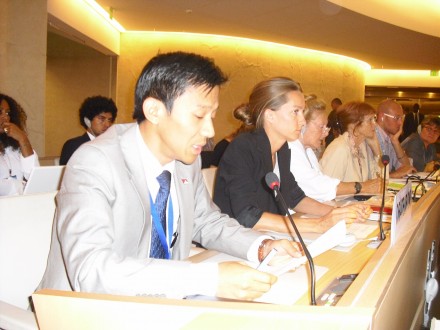
The High Commissioner for Human Rights, Ms Navi Pillay, stressed the “pressing need for protection of human rights defenders”, pointing out that “some countries use restrictive measures and ad hoc laws to curtail and violently attack peaceful dissidents, human rights advocates, journalists, lawyers, civil society’s scope of action and social activism.”
Ms Pillay strongly urged the UN Human Rights Council and the international community to “support squarely and vocally human rights defenders”.
A representative of Society for Threatened Peoples appraised the UNHRC about Karma Samdrup, a well-known Tibetan businessman, philanthropist and environmentalist, who is serving a 15-year jail term on alleged charges of buying stolen relics in 1998. He is the founder of the Snowlands Three Rivers Environmental Protection Group.
The cause of Samdrup’s arrest in January this year was the Chinese authorities’ vendetta against him for defending his two younger brothers, Rinchen Samdrup and Chime Namgyal, who are in jail since August 2009 for accusing a police official in Chamdo Prefecture of illegal poaching. “By jumping to his brothers’ defense, Karma Samdrup apparently angered some powerful people,” The New York Times reported.
Speaking on behalf of Society for Threatened Peoples, Mr Tenzin Samphel Kayta, informed the UNHRC of how Karma Samdrup was “severely tortured by the police during several months of interrogation and the court’s dismissal of his testimony as irrelevant”.
Mr Kayta briefed the Council on the debilitated health condition of Karma Samdrup. “… I just didn’t recognise him. How could his tall and upright body become thin and small? The body that passed me looked like one of a slim and fragile college student,” Samdrup’s wife wrote in a blog.
He also informed the Council that six family members of Karma Samdrup were arrested, sentenced and reportedly tortured within a span of one year. Four of them are undergoing “re-education through labour” in prison, while the whereabouts of two remain unknown.
Urging the Chinese government to implement the recommendation put forward by the UNHRC High Commissioner, Special Rapporteur on Human Rights Defenders and the Committee Against Torture, Mr Kayta called for an “end to harassment against human rights defenders and Tibetan intellectuals in Tibet”.
The Chinese delegation at the Council used their oft-repeated tactic to avoid NGOs speak on their rights record by interrupting Mr Kayta in making his statement.
A US delegate defended the NGOs by saying “whether delegates agree or not we should hear NGOs statement as they are accredited to this institute”.
Despite the Chinese delegation’s objection, Mr Kayta managed to complete his statement and was able to draw more attention from delegates and NGOs participants on the issues.
